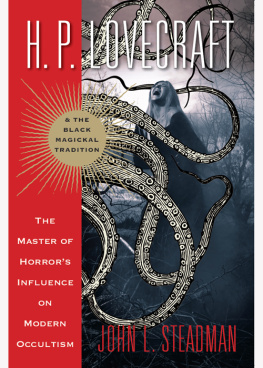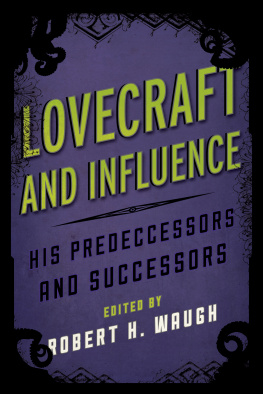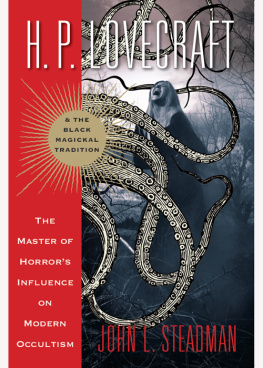Howard Lovecraft - The Moon Bog
Here you can read online Howard Lovecraft - The Moon Bog full text of the book (entire story) in english for free. Download pdf and epub, get meaning, cover and reviews about this ebook. genre: Science fiction. Description of the work, (preface) as well as reviews are available. Best literature library LitArk.com created for fans of good reading and offers a wide selection of genres:
Romance novel
Science fiction
Adventure
Detective
Science
History
Home and family
Prose
Art
Politics
Computer
Non-fiction
Religion
Business
Children
Humor
Choose a favorite category and find really read worthwhile books. Enjoy immersion in the world of imagination, feel the emotions of the characters or learn something new for yourself, make an fascinating discovery.

- Book:The Moon Bog
- Author:
- Genre:
- Rating:3 / 5
- Favourites:Add to favourites
- Your mark:
- 60
- 1
- 2
- 3
- 4
- 5
The Moon Bog: summary, description and annotation
We offer to read an annotation, description, summary or preface (depends on what the author of the book "The Moon Bog" wrote himself). If you haven't found the necessary information about the book — write in the comments, we will try to find it.
The Moon Bog — read online for free the complete book (whole text) full work
Below is the text of the book, divided by pages. System saving the place of the last page read, allows you to conveniently read the book "The Moon Bog" online for free, without having to search again every time where you left off. Put a bookmark, and you can go to the page where you finished reading at any time.
Font size:
Interval:
Bookmark:
The Moon Bog
by Howard Philips Lovecraft
Somewhere, to what remote and fearsome region I know not, Denys Barry has gone. I was with him the last night he lived among men, and heard his screams when the thing came to him; but all the peasants and police in County Meath could never find him, or the others, though they searched long and far. And now I shudder when I hear the frogs piping in swamps, or see the moon in lonely places.
I had known Denys Barry well in America , where he had grown rich, and had congratulated him when he bought back the old castle by the bog at sleepy Kilderry. It was from Kilderry that his father had come, and it was there that he wished to enjoy his wealth among ancestral scenes. Men of his blood had once ruled over Kilderry and built and dwelt in the castle, but those days were very remote, so that for generations the castle had been empty and decaying. After he went to Ireland, Barry wrote me often, and told me how under his care the gray castle was rising tower by tower to its ancient splendor, how the ivy was climbing slowly over the restored walls as it had climbed so many centuries ago, and how the peasants blessed him for bringing back the old days with his gold from over the sea. But in time there came troubles, and the peasants ceased to bless him, and fled away instead as from a doom. And then he sent a letter and asked me to visit him, for he was lonely in the castle with no one to speak to save the new servants and laborers he had brought from the North.
The bog was the cause of all these troubles, as Barry told me the night I came to the castle. I had reached Kilderry in the summer sunset, as the gold of the sky lighted the green of the hills and groves and the blue of the bog, where on a far islet a strange olden ruin glistened spectrally. That sunset was very beautiful, but the peasants at Ballylough had warned me against it and said that Kilderry had become accursed, so that I almost shuddered to see the high turrets of the castle gilded with fire. Barrys motor had met me at the Ballylough station, for Kilderry is off the railway. The villagers had shunned the car and the driver from the North, but had whispered to me with pale faces when they saw I was going to Kilderry. And that night, after our reunion, Barry told me why.
The peasants had gone from Kilderry because Denys Barry was to drain the great bog. For all his love of Ireland , America had not left him untouched, and he hated the beautiful wasted space where peat might be cut and land opened up. The legends and superstitions of Kilderry did not move him, and he laughed when the peasants first refused to help, and then cursed him and went away to Ballylough with their few belongings as they saw his determination. In their place he sent for laborers from the North, and when the servants left he replaced them likewise. But it was lonely among strangers, so Barry had asked me to come.
When I heard the fears which had driven the people from Kilderry, I laughed as loudly as my friend had laughed, for these fears were of the vaguest, wildest, and most absurd character. They had to do with some preposterous legend of the bog, and a grim guardian spirit that dwelt in the strange olden ruin on the far islet I had seen in the sunset. There were tales of dancing lights in the dark of the moon, and of chill winds when the night was warm; of wraiths in white hovering over the waters, and of an imagined city of stone deep down below the swampy surface. But foremost among the weird fancies, and alone in its absolute unanimity, was that of the curse awaiting him who should dare to touch or drain the vast reddish morass. There were secrets, said the peasants, which must not be uncovered; secrets that had lain hidden since the plague came to the children of Partholan in the fabulous years beyond history. In the Book of Invaders it is told that these sons of the Greeks were all buried at Tallaght, but old men in Kilderry said that one city was overlooked save by its patron moon-goddess; so that only the wooded hills buried it when the men of Nemed swept down from Scythia in their thirty ships.
Such were the idle tales which had made the villagers leave Kilderry, and when I heard them I did not wonder that Denys Barry had refused to listen. He had, however, a great interest in antiquities, and proposed to explore the bog thoroughly when it was drained. The white ruins on the islet he had often visited, but though their age was plainly great, and their contour very little like that of most ruins in Ireland , they were too dilapidated to tell the days of their glory. Now the work of drainage was ready to begin, and the laborers from the North were soon to strip the forbidden bog of its green moss and red heather, and kill the tiny shell-paved streamlets and quiet blue pools fringed with rushes.
After Barry had told me these things I was very drowsy, for the travels of the day had been wearying and my host had talked late into the night. A man-servant showed me to my room, which was in a remote tower overlooking the village and the plain at the edge of the bog, and the bog itself; so that I could see from my windows in the moonlight the silent roofs from which the peasants had fled and which now sheltered the laborers from the North, and too, the parish church with its antique spire, and far out across the brooding bog the remote olden ruin on the islet gleaming white and spectral. Just as I dropped to sleep I fancied I heard faint sounds from the distance; sounds that were wild and half musical, and stirred me with a weird excitement which colored my dreams. But when I awaked next morning I felt it had all been a dream, for the visions I had seen were more wonderful than any sound of wild pipes in the night. Influenced by the legends that Barry had related, my mind had in slumber hovered around a stately city in a green valley, where marble streets and statues, villas and temples, carvings and inscriptions, all spoke in certain tones the glory that was Greece . When I told this dream to Barry we had both laughed; but I laughed the louder, because he was perplexed about his laborers from the North. For the sixth time they had all overslept, waking very slowly and dazedly, and acting as if they had not rested, although they were known to have gone early to bed the night before.
That morning and afternoon I wandered alone through the sun-gilded village and talked now and then with idle laborers, for Barry was busy with the final plans for beginning his work of drainage. The laborers were not as happy as they might have been, for most of them seemed uneasy over some dream which they had had, yet which they tried in vain to remember. I told them of my dream, but they were not interested till I spoke of the weird sounds I thought I had heard. Then they looked oddly at me, and said that they seemed to remember weird sounds, too.
In the evening Barry dined with me and announced that he would begin the drainage in two days. I was glad, for although I disliked to see the moss and the heather and the little streams and lakes depart, I had a growing wish to discern the ancient secrets the deep-matted peat might hide. And that night my dreams of piping flutes and marble peristyles came to a sudden and disquieting end; for upon the city in the valley I saw a pestilence descend, and then a frightful avalanche of wooded slopes that covered the dead bodies in the streets and left unburied only the temple of Artemis on the high peak, where the aged moon-priestess Cleis lay cold and silent with a crown of ivory on her silver head.
I have said that I awaked suddenly and in alarm. For some time I could not tell whether I was waking or sleeping, for the sound of flutes still rang shrilly in my ears; but when I saw on the floor the icy moonbeams and the outlines of a latticed gothic window, I decided I must be awake and in the castle of Kilderry. Then I heard a clock from some remote landing below strike the hour of two, and knew I was awake. Yet still there came that monstrous piping from afar; wild, weird airs that made me think of some dance of fauns on distant Maenalus. It would not let me sleep, and in impatience I sprang up and paced the floor. Only by chance did I go to the north window and look out upon the silent village and the plain at the edge of the bog. I had no wish to gaze abroad, for I wanted to sleep; but the flutes tormented me, and I had to do or see something. How could I have suspected the thing I was to behold?
Font size:
Interval:
Bookmark:
Similar books «The Moon Bog»
Look at similar books to The Moon Bog. We have selected literature similar in name and meaning in the hope of providing readers with more options to find new, interesting, not yet read works.
Discussion, reviews of the book The Moon Bog and just readers' own opinions. Leave your comments, write what you think about the work, its meaning or the main characters. Specify what exactly you liked and what you didn't like, and why you think so.



